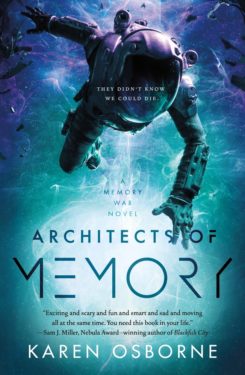
What is the best weapon you can have in a science fiction novel? Sometimes, the answer is ‘who’ and not ‘what.’ Karen Osborne, debut author of Architects of Memory and the newly released Engines of Oblivion, joined us to share her favorite humans turned weapons of science fiction—do you agree with her choices?
By Karen Osborne
Guns. Bombs. Bioweapons. Sometimes all of it is just not enough to get what you want. Whether you’re talking about reincarnated traitor generals or small children that know every magical spell ever written, a living, breathing human weapon is an absolute must for any decent aspiring space despot’s growing arsenal—because sometimes, you just need a weapon that can think on its own.
The recipe is simple: take one soldier with tactical talent, give them wildly destructive powers, remove the ability to make decisions for themselves, and stop treating them like a human being. Perhaps you’ll get lucky and they’ll stop thinking of themselves that way, too. They’ll pull their own pin and hug their own trigger.
Just be careful—sometimes your newly-forged weapons remember who they were before you came along…
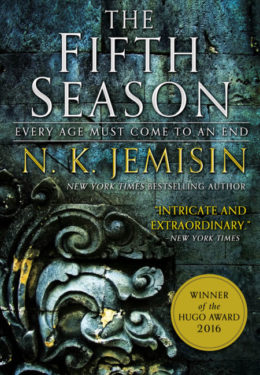 Essun and the Orogenes — The Fifth Season by N.K. Jemisin
Essun and the Orogenes — The Fifth Season by N.K. Jemisin
At the beginning of The Fifth Season, all Essun wants is to be left alone to raise her children, but that’s not going to happen, as her husband is about to find out they’re all orogenes.
To be an orogene is to have immense power: to command the energy of the earth, to cause earthquakes and volcanos, to channel water and even kill others. To manifest as an orogene is to be feared. You risk being killed or given to the Fulcrum, an organization that will train you to channel your abilities and use them in service of the society that hates you.
But you don’t get a say about that. You become a weapon in the Fulcrum’s hands, to be used as seen fit. And after being taken from your parents, dehumanized, mistreated and enslaved, how long until you pull your own trigger?
At the beginning of this book, everyone finds out. An orogene rips open the center of the world’s great supercontinent, causing the apocalyptic, climate-changing Fifth Season, and, as the Fulcrum discovers, even a human weapon cannot look away from the power of love.
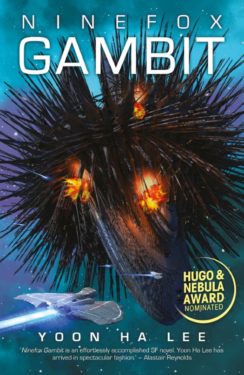 General Shuos Jedao — Ninefox Gambit by Yoon Ha Lee
General Shuos Jedao — Ninefox Gambit by Yoon Ha Lee
What immortal dictator doesn’t want a tractable pocket tactician? The leaders of the spacebound hexarchate have one in the form of Shuos Jedao, one of the most gifted military minds of his generation. There’s just one problem: he’s insane.
During his life, Jedao never lost a battle—until he turned heretical traitor and burned an entire fleet under his command. Jedao’s disembodied mind was stored away until the hexarchate needed a win, then forced to win battles for the hexarchate as punishment.
In his revenant form, he isn’t allowed to sleep, nor does he have control of the body into which he’s installed. This time, that body belongs to Kel Cheris, a math genius and dedicated soldier skating on the edge of heresy herself. He’s nothing more than an intelligent weapon meant to help Cheris win the next big fight.
But there’s a problem with hosting a pocket tactician who’s smarter than you. If the hexarchate can’t see what that is, not even immortality will be able to help them.
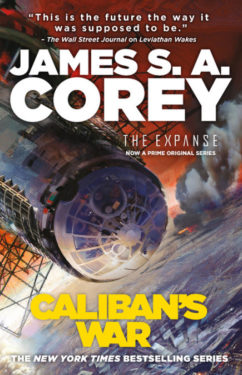 Caliban — Caliban’s War by James S.A. Corey
Caliban — Caliban’s War by James S.A. Corey
Any self-respecting space corporation out to create market-rattling bioweapons can be expected to dabble around with alien technology. Protogen is no exception, using forgotten street children from Ganymede as matrices for their walking bioweapon Hybrids.
At first, the program appears to succeed, with the supersoldiers able to move fast, survive in hard vacuum, and tear apart hull plating like tissue paper, and Protogen makes an army of Calibans. But whether it was the alien protomolecule or some last, aching humanity inside their monstrous blue carapaces, the Hybrids refuse to submit to anyone, even after the company installed bombs in their bodies as a control measure.
This isn’t the only time Protogen attempts to turn alien technology into corporate profit. On Eros, they infect enough people with the protomolecule that it makes an entire asteroid sentient. As the characters would eventually find out, big space rocks make pretty good weapons by themselves.
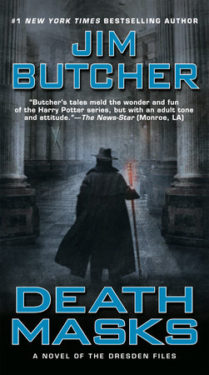 The Archive — Death Masks by Jim Butcher
The Archive — Death Masks by Jim Butcher
Even though the neutral Archive hasn’t yet been used as a weapon, she’s on this list because of how easily she could be—after all, in Harry Dresden’s world, knowledge is often power.
When we first meet the Archive, she doesn’t even have a name. The Archive is a child—and at the same time, a repository of all the human wisdom that has ever been written. Born to a mother that committed suicide rather than host the Archive, she’s been that way for as long as she can remember.
And that’s the problem. The Archive appears from book to book to mediate and fight for the side of good, but as a child, she doesn’t understand many of the things that she knows. She’s powerful, but she doesn’t understand just how powerful she could become. The sheer amount of power stuck in her changing teenage mind—well, anyone who spent three hours in a high school would understand why that might be concerning.
Luckily, the Archive is better off than some of our other walking weapons. She has Dresden’s assistance, as well as the help of her half-demon bodyguard, and she’s passed all the tests she’s been given. But who is to say that will always be the case?
 Takeshi Kovacs and the Envoys — Altered Carbon by Richard K. Morgan
Takeshi Kovacs and the Envoys — Altered Carbon by Richard K. Morgan
In Morgan’s cyberpunk world, people are virtually immortal. Human minds are separated from bodies to be “re-sleeved” at will. Takeshi Kovacs was a criminal before he was a member of the United Nations Envoy Corps, a group of supersoldiers who aren’t trained as much as conditioned, able to achieve superhuman feats partially because their conditioning strips them of all inhibitions when it comes to violence. (There’s a reason Envoys are prohibited from holding public office.)
When Kovacs leaves the service, he becomes a criminal again, and his recidivism is understandable. It’s impossible for a post-conditioning Envoy to live a normal life. There’s no bumpy transition back to a civilian world because the changes to his mind make it impossible for him to become a civilian. Kovacs is arrested and imprisoned in digital storage for years before being resurrected to work hazardous private-eye gigs, because if there’s something a human weapon knows how to do, it’s dueling spy operatives, blowing out airships, and taking out mob bosses—while getting reincarnated to do it over and over again.
Kovacs, of course, finds his place in it. After all, he’s a weapon now.
Karen Osborne is the debut author of Architects of Memory, on sale from Tor Books now, and Engines of Oblivion, on sale 2/9/21.
Order Architects of Memory Here:
Order Engines of Oblivion Here:






